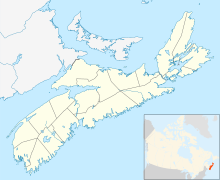Caledonia Mills (Scottish Gaelic: An Daigear) is a community in the Canadian province of Nova Scotia, located in Antigonish County.[1][2]
Alleged haunting
editIt is well known as the community of the Mary-Ellen spook farm, also known as the fire spook. It was alleged that the community experienced mysterious fires and poltergeist effects between 1899 and 1922. The case drew the attention of Arthur Conan Doyle, the author of Sherlock Holmes.[3] Mary-Ellen's biological parents were John and Annie (Duggan) MacDonald and she was later adopted by Alexander and Janet MacDonald of Caledonia Mills.
Walter Franklin Prince, research officer for the American Society for Psychical Research in 1922 investigated and concluded that the mysterious fires and alleged poltergeist phenomena were caused by Mary-Ellen in a dissociated state.[4] Prince had discovered inflammable liquid and noted that "the fires were undoubtedly set by human hands, judging by the unmistakable signs left in the house. The burns are never found on the wall paper higher than the reach of a person five feet tall, which is the height of [the] girl in the family."[5]
See also
editReferences
edit- ^ "Caledonia Mills". Geographical Names Data Base. Natural Resources Canada. Retrieved 3 June 2018.
- ^ Fergusson, C. Bruce (1967). Place-Names and Places of Nova Scotia. Halifax, NS: Public Archives of Nova Scotia. p. 97. Retrieved 3 June 2018.
- ^ "The Fire-Spook of Caledonia Mills". The Town of Antigonish.
- ^ Colombo, John Robert. (2000). Ghost Stories of Canada. Dundurn. p. 43. ISBN 0-88882-222-7
- ^ Ghost Was a Girl, Dr. Prince Reports. The New York Times. March 16, 1922.
Further reading
edit- Anonymous. (1922). Wave of Spook Phenomena Follows Laying of Ghost by Dr. Prince in the Antigonish "Haunted House". The Washington Times.
- Frederick B. Edwards. (1922). In the Haunted House of Antigonish. New-York Tribune.
- Monica Graham. (2013). Fire Spook: The Mysterious Nova Scotia Haunting. Nimbus Publishing.
- Norman Carroll Macintyre. (1988). The Fire-spook of Caledonia Mills. Sundown Publications.
